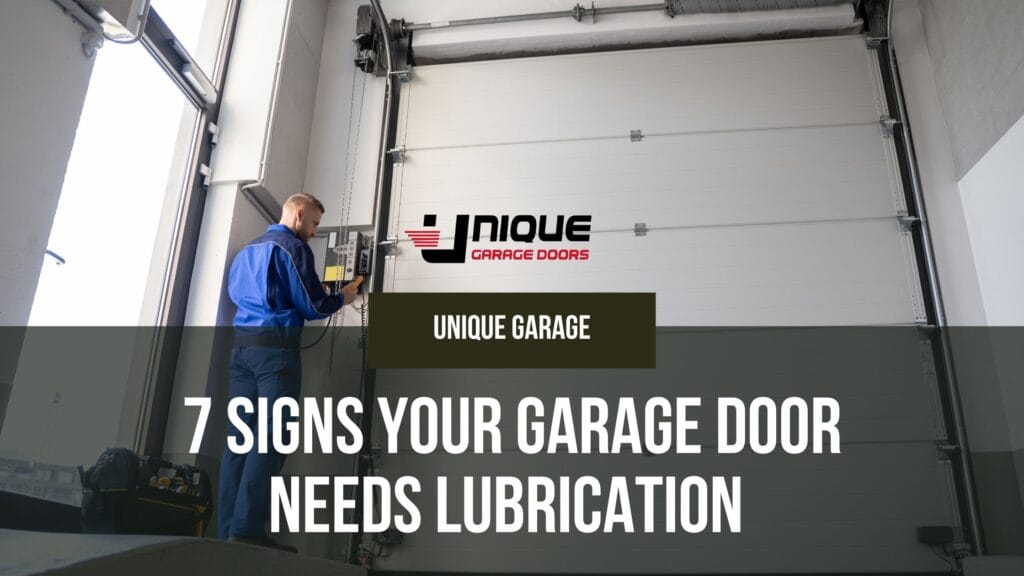Is Your Garage Door Begging for Attention? Here’s How to Tell (and What to Do About It!)
Your garage door is one of the hardest-working parts of your home, but let’s be honest—it’s easy to forget it needs regular TLC. Ignoring your garage door’s maintenance might seem harmless at first, but over time, it can lead to annoying squeaks, jerky movements, or even costly repairs.
Want to know if your garage door is due for some quick maintenance? Here are seven telltale signs it needs lubrication to keep running smoothly and how you can make it last longer with just a little attention.
1. Your Garage Door Sounds Like It’s Straight Out of a Horror Movie
A garage door that creaks, squeaks, or grinds with every use is practically begging for lubrication. That noise means the metal parts are straining against each other, creating friction and wearing down faster. With just a bit of high-quality silicone-based lubricant, you can enjoy a smoother, quieter door and prevent further damage.
2. It’s Moving in Awkward, Jerky Motions
Does your garage door move with little stops and starts? A door that doesn’t glide smoothly can make it frustrating to open and close. It’s usually a sign that key parts need lubrication. Not only will lubrication give you a smooth and seamless motion, but it will also reduce wear on the opener, saving you from expensive repairs.
3. It’s Getting Tougher to Open or Close
If your garage door feels heavier or harder to lift, it could be due to dry, friction-heavy parts. Proper lubrication reduces that friction, making it easy to open and close with minimal effort. You’ll not only enjoy easier manual operation but also protect your automatic opener from working overtime.
4. Rollers or Tracks Seem Sticky or Stuck
Your door’s rollers and tracks should glide effortlessly, but when they’re sticky, your door starts to slow down. By lubricating these areas, you’ll keep the door moving smoothly, while also preventing rust and buildup that can cause even more sticking. It’s a quick fix that can save you a lot of hassle in the long run.
5. You Spot Rust or Noticeable Wear on Metal Parts
Take a moment to inspect your garage door’s springs, hinges, and other moving parts. If you see rust, it’s a sign of overdue maintenance. Rust can weaken parts, causing more resistance and even breakage. With a simple application of lubricant, you can protect these components from moisture, which will keep them strong and functioning well.
6. The Door Shakes and Vibrates While Moving
A garage door that vibrates excessively as it opens or closes is usually experiencing friction in key areas. This shaking can lead to loose screws or bolts and misalignment over time. Lubricating parts like the hinges, rollers, and springs can cut down on these vibrations, making your door’s movement smooth and steady again.
7. Your Opener Seems to Be Working Too Hard
If your automatic opener sounds like it’s putting in extra effort just to open and close the door, it might be a sign that your garage door parts are too dry. Lubricating parts like the chain or belt, springs, and hinges can help the opener run more quietly and without straining, which protects it from wearing out too soon.
Make Your Garage Door a Priority—It’s Worth It!
Each of these signs is a signal from your garage door that it needs a little attention. By taking a few minutes to lubricate its parts, you’re helping it work better, last longer, and run quieter. It’s a small effort with a big payoff in peace of mind and smooth, reliable performance.
Ready to Give Your Garage Door the Care It Deserves?
Don’t wait until the noises or jerky movements turn into a bigger problem! Our team of garage door experts is here to help you identify what your door needs and provide the right solutions to keep it in top shape. Book a free consultation call with us today and let’s make sure your garage door gets the care it deserves—so it stays dependable and hassle-free for years to come!

